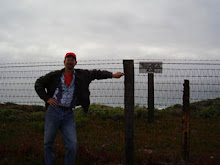
SO TODAY's lunch was Chinese take-out from Hop Feng II. Even if you're from Charlotte, I doubt you would be able to find Hop Feng II with a map and a compass. (Hop Feng I, I am fairly certain, no longer exists.) But it's the best Chinese take-out in this little metropolis. Here I have house lo-mein, fried dumplings, and yet again more Kona Longboard Lager, about which more in a moment.

Today's film was
Mishima: A Life In Four Chapters, which is something I decided I needed to see fairly recently. I got it in the mail a coupla days ago, and kind of put off watching until I had the proper ingredients assembled. At first I was a bit unsure as to the politics of eating Chinese take-out while watching a movie about perhaps Japan's most prolific and--arguably-- best writer, but it actually made a fair amount of sense. Especially including the Kona beer, which I have convinced myself is the invention of still more pasty-faced Round Eyes money-grubbers, regardless of whether that's the case or not. I dunno. It just makes me
feel better about myself. The
Onion AV Club review (which, of course, is what prompted me to see this) describes it as director Paul Schrader's magnum opus, and praises the score by Phillip Glass for being at once remarkable and at the same time immersed in the film and its subject matter. But then the first title card informed me that this film was made possible by the efforts of George Lucas and Francis Ford Coppola.
Who are both individuals of great accomplishments, but also incredibly egotistical people capable of being enormously silly and self-important. But on the third hand, if they were actually intrumental in making it possible for me to see this, I must offer my thanks. For it was lovely. Gorgeous. Terrible to watch in parts, yet impossible to turn away from. Mishima was a man of incredible contradictions, fascinated by both life and death, a militarist who evaded military service, and a dedicated family man and deeply closeted homosexual. (Hell. Mishima wasn't closted; he was garaged.) And the film was astoundingly kind to him, attempting to invite as complete as possible an understanding of this incredibly complex man.
Of course, I fancied that I had a pretty good understanding going in, having read quite a bit of his work and having read as much as I have been able to find about him. Of course, the film opens with a biographic text informing us that Mishima wrote, over the course of his adult life, 35 novels, 25 plays, and over 200 short stories.
Gagph. I've barely scratched the surface.
Anyways. The film uses the events surrounding Mishima's death as a framing device, and then uses a precis of four of his major works as supports for weaving the tapestry of his life. Some of the techniques Schrader used as cues for separating the sections-- the end story is all shot in color, the biography bits are in black & white, and the story segments take place on abstract sets that look like a cross between cabaret and kabuki-- could have come off jarringly, but instead meld almost seamlessly together. It is long though-- two hours, which turned into 2:20 because I had to rewind to catch a couple of subtitled sections I missed because I was busy wrestling with dumplings and noodles and chopsticks, and yeah, it definitely felt like two hours-- but it was time well spent. Especially since I ate all eight dumplings, the entire carton of noodles (which the lads at Hop Feng pack in like a parachute), and uncustomarily cracked into a third beer before the whole thing was said and done.
So do I recommend it? Have a dumpling.
Labels: Abstraction, History, Tradition







